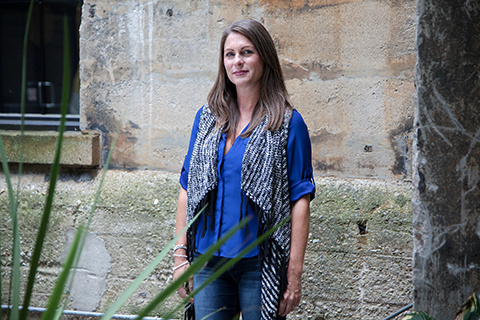
Carol Leaman is one of the few who’ll tell you that she’s never had an issue with being a woman in tech.
“I have confidence which allows me to behave in a way that men don’t see as vulnerable,” says the 25-year industry veteran and CEO of e-learning software company Axonify.
Of course, Leaman isn’t the only confident woman in tech – but all the confidence in the world hasn’t been enough to address the shortage of women in senior positions, the dearth of advancement opportunities, and persistent sexism in the industry.
As with other corporate cultures, challenges for women can feel woven into the fabric of the tech sector: Women comprise only three per cent of Canadian tech CEOs and less than a quarter of Canada’s tech sector is populated by women. Just five per cent of Canadian female founders get funding, according to MaRS Discovery District’s Ilse Treurnicht and AceTech Ontario’s Jodi Kovitz, who presented at a MaRS-hosted series on women in tech called Moving the Dial earlier this year.
Canadian universities are seeing classes of 39 per cent women graduate from their STEM programs (with the University of Waterloo graduating about 31 per cent), but these women are not sticking around once they get jobs in the field. About 46 per cent of young women leave the tech sector within two years of starting out, compared to 23 per cent of men, Communitech reports. As recently as 2014, only eight per cent of tech startups in Waterloo Region were co-founded by women.
One look at the headlines out of Silicon Valley lately – that now infamous memo from a Google engineer railing against the company’s diversity initiatives, the resignation of a number of venture capitalists this summer in the wake of sexual harassment claims, and the continued saga of tech investor Ellen Pao, whose 2017 book Reset chronicles her failed sexual discrimination court challenge against her former firm, Kleiner Perkins – all but reinforces the view (and mounting evidence) that tech is openly hostile to women.
But Waterloo Region is not Silicon Valley, and Canada’s tech sector has a distinct advantage in that it can learn from American missteps and build a much more supportive environment for women to grow their businesses, stay in the industry and thrive within it. Communitech has been at the forefront of that effort and significantly moved the needle for women in Waterloo Region startups over the past few years by focusing on mentorship, sponsorship and retention with programs such as the Fierce Founders bootcamps, a series of competitive, rapid-fire sessions designed to help women founders and entrepreneurs build out their business models with the hands-on help of mentors and peers. The Fierce Founders accelerator, founded in 2016, is the first in Canada to focus exclusively on women. And a key part of the Communitech strategy is gender neutral – by challenging both men and women to consider why diversity is crucial to growth, a more robust conversation has helped foster new ways of thinking about gender equality in the tech ecosystem.
"Communitech has very actively invested money into programs and support and encouragement of women in tech.” – Carol Leaman
The mission to affect diversity change started roughly a decade ago at Communitech, when these conversations were just a whisper in the broader culture. Leaman remembers current Communitech CEO Iain Klugman asking her, over lunch at Solé restaurant, why there weren’t more women in tech. He wanted to know how Communitech could help draw them in. At the time, Leaman said more would eventually join because women were starting families later and more of them stayed in their careers once they had children. Her prediction has since come true. “But in addition, Communitech has very actively invested money into programs and support and encouragement of women in tech,” she says. “They’ve definitely done their part.”
This is the story of how.
Funding change
Back in 2007, the same year Klugman and Leaman had that chat over lunch, Alayne Hynes joined Communitech, working with a charitable partner to help get more kids interested in STEM-related careers. It was extra tough to dazzle the girls, she says, because they weren’t being taught to get excited about science and tech. Six years and a few roles later, Hynes learned that Communitech had received a grant of $300,000 from the Status of Women agency – a branch of the federal government – to develop targeted, formal programming to foster the development of women in the industry. So began her role as the architect of Communitech’s Women in Tech program. “Being a woman with a STEM degree, it was really interesting for me to dive in there and try to start this particular conversation,” she says. With the support of some of Waterloo Region’s tech companies, such as D2L and Leaman’s Axonify, she began by conducting an in-depth needs analysis and found women were not getting the level of mentorship enjoyed by men. They also wanted additional training in areas of leadership and communication.
Communitech launched some networking events under the Women in Tech banner. The goal was to draw both women and men into conversations about what the ecosystem could do to help its companies be more successful. “I think it took until the third event for me to say ’What on earth am I doing wrong?’” says Hynes. The events were attracting 100 per cent women – so they got some male guest speakers, including Steve Woods, Senior Engineering Director at Google Canada (now Communitech Chairman), to make a presentation at a networking event and found that helped bring out more men. Prior to the networking events, they began by running smaller peer-to-peer groups and then, eventually, a mentoring program was added.
They didn’t see huge shifts in the numbers of women staying in the tech sector or being promoted or starting companies in the early going, Hynes says. But Communitech took its programming to the next level in 2014, when Hynes and her team drafted a proposal for Google’s global women entrepreneurship campaign #40forward, which aimed to get 40 tech organizations around the world committed to better supporting women at the startup stage. Communitech’s idea was to create a bootcamp for women entrepreneurs in the tech sector.
“We saw that this could be a catalyst to really push these organizations that were being run by really successful, high-potential women. We could really help them,” says Hynes. That idea secured funding from Google. Danielle Graham, who co-founded sustainable home drinking-water treatment company Crio Water, was tasked with creating the bootcamp from scratch. She had three months to pull it off before the money would run out.
Google had signed on to sponsor a six-day workshop to help women founders kickstart their businesses. Graham split them into three-day sessions, with a month in between in which each of the participating companies would validate their business through customer interviews, a pitch deck and a lean business model canvas. Then, they’d narrow down the 25 companies to eight, and pitch to a panel of judges in order to win a $25,000 prize. “It would be based on merit, it would be based on hard work, it would be based on things that were relevant to their business that they needed to spend their time doing anyway,” Graham says. Over the six days, they met 40 mentors, speakers and advisors and thought in a really focused, strategic way about how to grow their business. The Fierce Founders program was born.
“Everyone said, ‘Good luck filling the room with 25 women.’” – Danielle Graham
“Everyone said, ‘Good luck filling the room with 25 women,’” Graham recalls before the first bootcamp launched. More than 100 female entrepreneurs applied. They also drew interest from Silicon Valley, where women entrepreneurs only dreamed of getting that level of support. “We even had a woman fly in from England.”
The networking proved invaluable, and Graham still sees women who’d met during the first cohort show up at events together. A Waterloo Region Lean In group, inspired by Sheryl Sandberg, now boasts 282 members who regularly meet and discuss their careers. Fierce Founders recently wrapped its fifth bootcamp and has since launched an accelerator which Graham says functions as a “pipeline” to other accelerator programs, including Communitech Rev, an intensive accelerator that helps Canadian tech companies scale up their businesses.
The payoff
The focus on gender equity in tech has yielded some pretty impressive results in a very short time. The population of women founders in the Waterloo Region startup community has more than tripled, growing from eight per cent in 2014 to 26 per cent in 2017. Communitech can claim a huge role in that – and for being vocal on the importance of diversity overall, says Joseph Fung, a Communitech board member and CEO of new management automation platform, Kiite.
The ripple effect is that it inspires companies to address diversity within their own ranks. Fung’s new company, for example, has started with a gender balance of 50 per cent women.
To Fung, it’s smart business.

Jennifer Moss, co-founder, Plasticity Labs (Photo: Simon Willms)
“The more diverse your team, the better your decision making, the better job you have empathizing and ensuring your products are understood and appreciated by a broader audience.” In such a male-dominated space, says Fung, the impact of hearing other male voices champion the idea of having women on a startup team can have a cumulative effect. Challenging men to walk the talk is key, he adds.
And while Canada’s tech sector is much friendlier to women than California’s, says Plasticity Labs co-founder Jennifer Moss, who worked in San Jose before launching her startup with her husband in Waterloo, Canada’s tech community can’t be smug or complacent.
“A lot of those philosophies still live here,” she says, referring to the sexism scandals that have erupted in Silicon Valley in recent months. Moss blogged about the departure of Uber CEO Travis Kalanick amidst sexual harassment allegations earlier this year, and rejected the idea that rapid growth is what made sexism and misogyny spread throughout the company. “It started with the core of where we begin, at startup founders. We don’t think about culture until it’s too late,” she says.
A positive working culture might consider greater flexibility and structures in place to support women startup founders who do want to have families, says Moss, who scoffs at Facebook’s freeze-your-eggs support, because it inherently rejects the idea that you can be successful in tech and have a family.
It could also help to have more women in venture capital, says Moss, who admits she’ll send her husband and co-founder Jim Moss into those meetings. “Not only do you feel in a powerless position [in those meetings], but you’re also a female. So, you know it’s very unlikely that you’re gonna get funded,” she says.
Given that these roadblocks remain, Communitech’s steady and devoted work on gender diversity – and all of its successes since the Women in Tech program launched more than four years ago – is still a work in progress. The Fierce Founders accelerator, for example, is specifically focused on helping women get more access to venture capital as well as drawing more women founders into the sector to begin with, Klugman said when it was announced last year.
In the meantime, there is one investor relationship Moss is quite happy to handle herself – the one with her Business Development Bank of Canada (BDC) contact, Nicole LeBlanc.
“I feel completely comfortable having those conversations. Because she wants to see me win, as a woman.”

